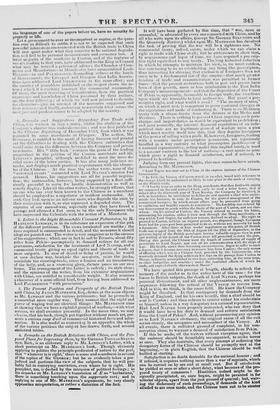1. Remarks and Suggestions Regarding Pree Trade with China, was written
in that country, whilst the abolition of the Compam's charter was underdiscussion ; and was first published in the Chinese Repository of December 1833, from which it was reprinted by some merchants at Glasgow. The author, Mr. Gonessils is entitled to the merit of having foreseen and pointed out the difficulties in dealing with the Chinese authorities that would arise ft-em the difference between the Company and private merchants. his " little book " contains the germ of the leading suggestions in the petition of the Canton merchants and air. LINDSAY'S pamphlet, although modified to meet the more decided views of the latter parties. It has also many judicious remarks. and displays much practical acquaintance with the character of the Chinese. At the time the author wrote, none of the "untoward events " connected with Lord NAPIER'S mission bad occurred. Hence, his suggestions are all for peaceful negotiation; the ambassador, however, being supported by a fleet sufficiently powerful to serve for hostile demonstration as well as courtly display. Like all the other writers, he strongly affirms, that no one who has ever been known to the Chinese as a merchant should be employed as a negotiator or resident ambassador. All such they took upon as an inferior caste, who degrade the state by their connexion with it, or else represent a degraded state. The captains of our men-of-war, especially after they have forced a passage and silenced a fort seem to be the only Europeans who have impressed the Celestials with the notion of a Mandarin.
2. Letter to the Right Honourtble Viscount Palmerston, by H. HAMILTON LINDSAY, is in its substance an expansion of the pith of the different petitions. The views inculcated are warlike; the force required is enumerated in detail, and the measures it should adopt are pointed out. The writer is very sanguine as to the success of his suggestions; which are in fact to sail to Teensin, about fifty miles from Pekin—peremptorily to demand redress fur all our grievauces, satisfaction for the treatment of Loid NAPIE.R, and a commercial treaty giving us equal rights and liberty of trade at more outposts. In case of denial or delay of justice, he would at once declare war, blockade the sea-ports, seize the junks, annihilate the coasting-trade, cause a famine and an insurrection of the belly, and, as a crowning glory, dictate peace on our own terms. The arrangement of the Letter is orderly; its style clear; and the opinions of the writer, from his extensive acquaintance with China, are entitled to considerable weight. It also assumes a character of a semi-official kind, from having been addressed to Lord PALMERSTON "with permission."
3. The Present Position and Prospects of the British Trade with China, by JAMES MATHESON, Esq., drives at the same objects as Mr. LINDSAY and the various petitioners; but lie proceeds in a somewhat more regular way. They assume that the right and power of waging war are identical things : Mr. MATHESON aims at showing that we have a rightful ground of warfare,—with what Success, we shall examine presently. In the mean time, we may ebserve, that his book, though put together without much art, presents a curious coup d'wil olcommercial historical facts and information. It is also useful as contandog in an appendix the whole of the various petitions the subject has drawn forth, and several statistical tables.
4. Remarks on the British Relations with China, and the Proposed Plans for Improving them, by Sir GEORGE THOMAS STAUNTON, Bart., is an elaborate reply to Mr. LINDSAY'S Letter, with a short .postscript on Mr. MATHESON'S book. Though obviously applying to politics the principle predicated of nature by the poet, that "whatever is is right," there is sense and soundness in several of the replies of Sir GEORGE; but be so evidently takes a prejudiced and partisan-like view of the subjects, that he will probably fall in conveying conviction, even where he is right. His pamphlet, too, is dashed by the intrusion of political feelings ; in his remarks on Mr. LINDSAY 's translation of E as "barbarians," there. Is something touching upon the suppressio yen; and in replying to one of Mr. MATHESON'S arguments, he very closely anmelles misquotation, or rather a distortion of the fact.


























 Previous page
Previous page